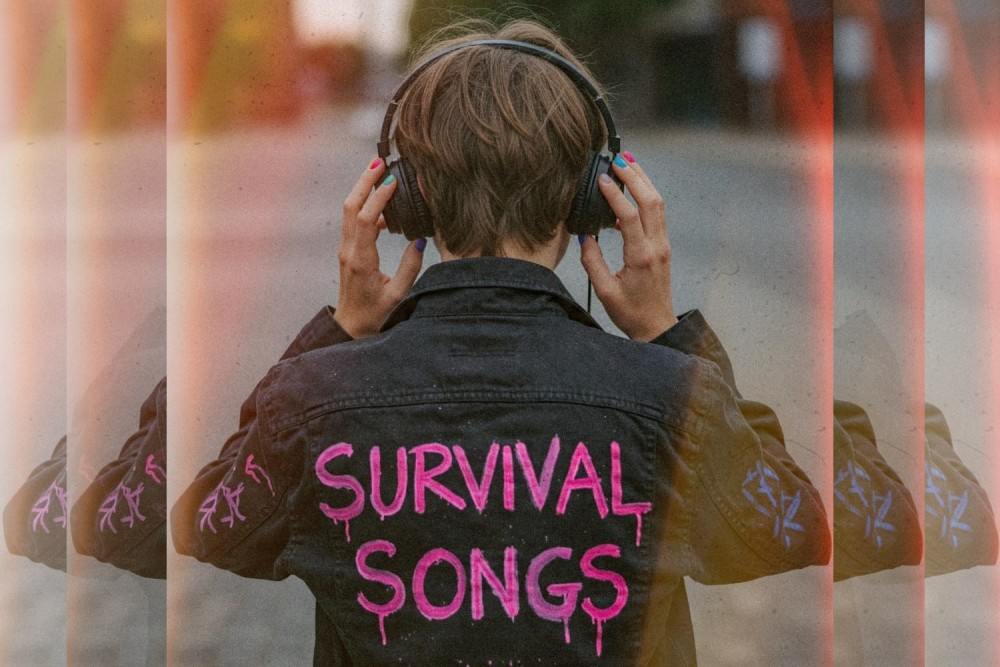Derek Webb’s new album offers songs for LGBTQ solidarity
Survival Songs champions queer lives—and challenges the silence of faith communities.

Derek Webb has been writing music for three decades, both as a solo artist and, in his early days, with the acclaimed Christian band Caedmon’s Call. He also has deep, personal connections to the LGBTQ community through friends and family. His new album, Survival Songs, was inspired by watching their struggles in an era of prolific Christian nationalist, anti-LGBTQ rhetoric and legislation.
As an intersex, transgender pastor, I was intrigued by the album’s effort to highlight a narrative of compassion and acceptance of queer, and specifically transgender, people. Webb says he wants these songs to make us feel less alone.
Webb pulls no punches in these songs. He blatantly and unapologetically names the experiences and fears of the queer community in 2025. I found a few moments a bit jarring, though I can’t help but think that’s the point. For example, in the song “Stay Safe,” he sings, Stay safe out in the open / I want you free, but I need you alive.”
“Queer Kid” is a song about conversations that Webb had with teenagers heading back to school after Trump’s election. “Nail Polish” is about why Webb paints his nails: it’s to draw attention and identify unsafe people when he’s out in public with LGBTQ friends and family. And “I Was There Too, It Won’t Be This Way Forever” tells the story of a potentially life-saving note a Starbucks barista slipped into a coffee sleeve after recognizing signs of self-harm on an LGBTQ child.
If it feels like all the songs are essentially saying the same thing, that just means you’re paying attention. The message is redundant by design. As Webb told me in an interview, “I would rather say one thing ten different ways than try and say ten different things on a project.”
Conversations around advocacy and politics are increasingly layered and complex, as they need to be. There seems to be no end to the urgent issues demanding our attention and intervention. In the current chaos, it can be hard to focus on a single issue, but this is what Survival Songs offers—it goes more deep than wide. Webb as a songwriter is not unlike a painter or a photographer capturing the same subject in a variety of seasons and light.
Webb is modeling what allyship and advocacy for LGTBQ people can look like. The time for subtlety has long since passed. Now more than ever, we need to be pulled off any fences we were daring to walk. In some ways, getting off the fence is risky—especially for anyone who has spent their career in the public eye. While Webb is no stranger to challenges to his public image and shifts in reputation, it’s a different story altogether to release a project knowing full well the subject matter will be controversial.
Webb believes the risk is well worth taking: “If I’m not using the songs I’m writing for my prophetic voice, I don’t feel like it’s worth the time and energy,” he said. “My friend, Nashville-based pastor Stan Mitchell, has on several occasions noted that ‘if you claim to be someone’s ally but aren’t getting hit by the stones thrown at them, you’re not standing close enough.’”
There are three things I take from this project—and from my conversation with Webb—that I hope those who desire to be an ally to the marginalized can learn:
- Be clear where you stand, both for those you stand with and those you aim to challenge. Ambiguity is sometimes good diplomacy, but it’s rarely good advocacy. Webb’s lyrics leave no room for doubt about where he stands on the issue of LGBTQ inclusion in faith communities and in society at large.
- If you’re telling a story, tell your own. Otherwise, turn up the mic and step aside. Webb sings with love and compassion for those of us walking our roads in the margins of gender and sexuality, but he’s telling us what he sees. This is his story, and we still get to tell our own.
- If you feel compelled to speak out, use your momentum. Survival Songs isn’t just the result of one month’s worth of writing and recording; it’s the next step in Webb’s ongoing process of singing the world he sees.
If you want to speak up and are not sure where your momentum may be, start by quietly paying attention to the people around you, and take note of where your attention is captured.
Webb noted that being an affirming presence in a person’s life is, statistically, the greatest act of harm reduction we can offer. “Jesus had his reputation willingly ruined as a result of caring for, living with, and loving the most marginalized people in culture,” he said. “If you wonder where the margins are, where Jesus would be standing, where the stones are being thrown, let me tell you without a doubt, it would be in the queer community.”
Walk into the path where the rocks are being thrown. Simply by showing up, you begin, as Webb sings, “traveling the lines of liberation.”





